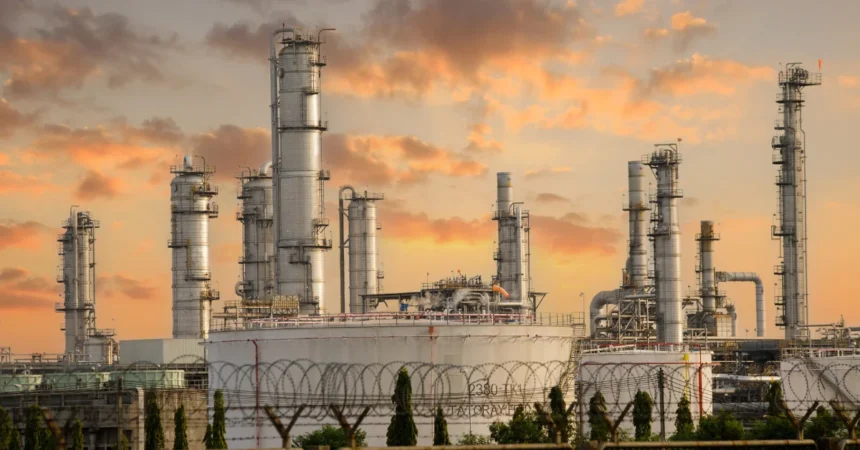In a significant development for Pakistan’s energy sector, the Pak-Arab Refinery Company (PARCO) has announced the temporary shutdown of its refinery for a period of 40 days. This scheduled maintenance is critical for ensuring the long-term functionality and efficiency of the refinery, which plays a pivotal role in the country’s oil and energy production. As one of the largest oil refineries in Pakistan, PARCO’s shutdown will temporarily disrupt fuel supplies, but industry insiders say the maintenance is necessary for uninterrupted future operations.
PARCO’s Role in Pakistan’s Energy Landscape
PARCO stands as one of the largest integrated energy companies in Pakistan, playing a major role in the refining, transportation, and marketing of petroleum products. Located near Multan in the heart of the country, PARCO’s refinery has an operational capacity of around 100,000 barrels per day, making it a crucial part of the nation’s oil supply chain. The refinery processes crude oil imported from the Middle East, converting it into a range of petroleum products including diesel, gasoline, jet fuel, and furnace oil, which are distributed throughout Pakistan.
With its extensive network of pipelines and storage facilities, PARCO is the backbone of the country’s fuel distribution infrastructure. The company operates one of the longest oil pipelines in South Asia, spanning over 2,000 kilometers from Karachi to Mahmoodkot, ensuring the steady supply of petroleum products across the country. Thus, when PARCO undergoes a scheduled shutdown, it naturally raises concerns about the potential impact on the fuel supply and the broader energy sector.
Why Scheduled Maintenance is Necessary
Scheduled maintenance is a routine practice in the oil and gas industry and is crucial for ensuring the long-term efficiency, safety, and reliability of refineries. Over time, refineries experience wear and tear due to the harsh conditions in which they operate. High temperatures, pressures, and the corrosive nature of crude oil and other chemicals put enormous strain on refinery equipment, making regular maintenance essential to avoid accidents and breakdowns.
PARCO’s decision to undergo a 40-day maintenance period reflects the company’s commitment to safety and operational excellence. Refineries that do not follow strict maintenance protocols run the risk of equipment failures, which can lead to unscheduled shutdowns, fires, leaks, or even explosions. A comprehensive maintenance cycle allows engineers to inspect, repair, and replace key components of the refinery, ensuring that the equipment can continue to function optimally for the foreseeable future.
Beyond safety concerns, maintenance is also important for optimizing the efficiency of a refinery’s operations. Modern refineries must operate at peak efficiency to remain economically viable, and maintenance downtime allows for the implementation of technology upgrades and the fine-tuning of processes. PARCO is no exception, and its scheduled maintenance aims to minimize disruptions in the long term by addressing potential issues before they arise.
Impact on Fuel Supply
While PARCO’s refinery will be temporarily out of service, the company has put in place contingency plans to mitigate the impact on fuel supplies. According to industry experts, PARCO has coordinated with other refineries and oil marketing companies (OMCs) to ensure that there are sufficient fuel reserves to cover the duration of the shutdown.
In particular, the Oil Companies Advisory Council (OCAC) has been working closely with PARCO to manage the country’s fuel inventories. Strategic reserves of diesel, gasoline, and furnace oil have been built up in the weeks leading up to the shutdown to ensure a smooth supply chain during the maintenance period. Additionally, imports of refined petroleum products are expected to increase to cover any shortfall in domestic production.
However, despite these measures, the shutdown may still lead to some regional shortages, particularly in areas that rely heavily on supplies from PARCO. For instance, fuel supply disruptions may occur in southern and central Pakistan, where PARCO’s pipeline network is the primary distribution channel for oil products. Fuel prices, already volatile due to global market fluctuations, could also see temporary increases if supply constraints intensify.
Economic Ramifications
The scheduled shutdown of the PARCO refinery has economic implications that extend beyond the energy sector. The refinery’s production contributes significantly to the overall availability of petroleum products in Pakistan, which in turn affects industries that rely on fuel for their operations. Key sectors such as transportation, manufacturing, and agriculture are particularly vulnerable to disruptions in the fuel supply chain.
Higher fuel costs, even if temporary, can ripple across the economy. The transportation sector, which depends on diesel and gasoline for both public and private transit, may experience a spike in operational costs. This increase can translate into higher prices for goods and services, as transport costs are passed on to consumers. Similarly, the agricultural sector, which relies on fuel-powered machinery for planting, irrigation, and harvesting, may face higher input costs during the refinery shutdown.
Moreover, the construction industry, which often requires large quantities of diesel for heavy machinery and equipment, may see delays in ongoing projects. If fuel becomes scarce or more expensive, construction firms might slow down their work, which could have a knock-on effect on infrastructure development across the country.
Global Market Dynamics and the Shutdown
The timing of PARCO’s scheduled maintenance comes at a period of heightened volatility in global oil markets. International oil prices have seen significant fluctuations over the past year due to a range of factors, including geopolitical tensions, production cuts by OPEC, and the ongoing transition to renewable energy sources. While Pakistan relies heavily on imported crude oil, disruptions in the refining process can exacerbate the country’s exposure to global price swings.
As the PARCO refinery shuts down, Pakistan will likely increase its reliance on imported refined petroleum products to meet domestic demand. However, global refining capacity has been under strain in recent months due to rising demand and underinvestment in new refining projects. As a result, the cost of importing refined products such as gasoline and diesel could increase, adding to Pakistan’s already substantial import bill.
Higher oil import costs would also put additional pressure on Pakistan’s balance of payments, potentially widening the country’s trade deficit. Given Pakistan’s current economic challenges, including a devaluing currency and rising inflation, the country’s ability to manage its energy imports efficiently during the refinery shutdown will be critical.
Government Measures and Industry Response
Recognizing the importance of maintaining a steady fuel supply, the Pakistani government has been actively involved in managing the situation. The Ministry of Energy and Petroleum, along with the Oil and Gas Regulatory Authority (OGRA), has been working closely with PARCO and other refineries to ensure that the shutdown does not lead to significant disruptions.
Government officials have reassured the public that the shutdown is a routine matter and that adequate steps have been taken to minimize any potential shortages. In the days leading up to the maintenance period, OGRA issued directives to oil marketing companies to build up their inventories and avoid stockpiling practices that could lead to artificial shortages.
In addition, the government has increased its oversight of the fuel distribution network, ensuring that there is no hoarding of petroleum products by unscrupulous actors seeking to profit from the temporary supply disruption. The Petroleum Division has also been monitoring global oil markets closely to secure favorable terms for any additional imports of refined products during the shutdown period.
The private sector has also played a proactive role in managing the situation. Oil marketing companies such as Pakistan State Oil (PSO) and Shell Pakistan have ramped up their import schedules to ensure that fuel stations remain stocked throughout the shutdown period. Moreover, some smaller refineries in Pakistan have increased their production to help fill the gap left by PARCO’s temporary closure.
Long-Term Benefits of the Shutdown
While the short-term effects of the PARCO refinery shutdown may cause some inconvenience, the long-term benefits of scheduled maintenance far outweigh the temporary disruptions. By ensuring that the refinery’s equipment is in top condition, PARCO will be able to maintain its high production levels, reduce the risk of unscheduled outages, and extend the lifespan of its facilities.
Furthermore, scheduled maintenance allows refineries to implement new technologies that improve efficiency and reduce environmental impact. As global pressure mounts to transition to cleaner energy sources, refineries around the world are being forced to adapt to stricter environmental regulations. PARCO, too, is expected to make upgrades that reduce emissions and improve the sustainability of its operations, aligning with Pakistan’s broader energy transition goals.
The maintenance period also provides an opportunity for PARCO to assess its operational needs and invest in training for its workforce. During the shutdown, engineers and technicians undergo specialized training to handle complex maintenance tasks and familiarize themselves with the latest technological advancements in the refining industry. This focus on capacity building ensures that PARCO’s operations remain world-class, contributing to Pakistan’s energy security.
#PARCOShutdown #OilRefinery #EnergyCrisis #FuelSupply #PakistanEnergy #ScheduledMaintenance #PakistaniEconomy #OilAndGas #RefineryShutdown #Petroleum








